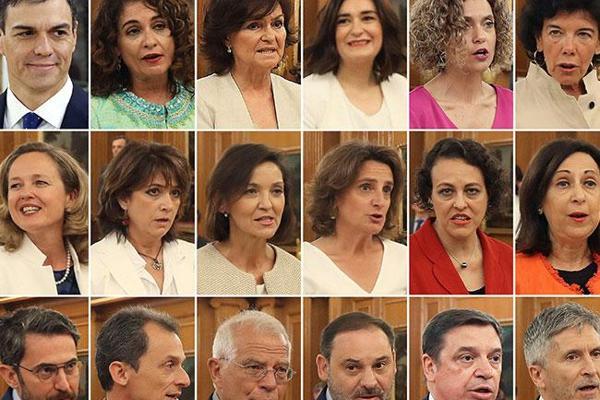Spain swears in new cabinet with record number of women
MADRID - Agence France Presse


King Felipe VI swore in Spain’s new pro-EU government on June 7 with a record 11 women members including in key posts such as defence and economy, and six male ministers.
With just 84 seats in Spain’s 350-seat parliament, Socialist Prime Minister Pedro Sanchez’s administration also has the smallest representation of any government since the country returned to democracy and it is not expected to last until the end of its mandate in 2020.
The new executive composed by the 46-year-old, who ousted conservative veteran Mariano Rajoy as prime minister last Friday in a no-confidence vote, includes astronaut Pedro Duque as science minister.
EU budget manager Nadia Calvino became economy minister and former European parliament president Josep Borrell foreign minister.
When Sanchez presented his cabinet on Wednesday evening he said it was “a reflection of the best in society” - a society he described as composed of women and men, old and young, rooted in the European Union.
But as a minority government it will have a tough time governing Spain, relying as it will on the votes of far-left party Podemos as well as Basque and Catalan nationalist lawmakers who supported his no-confidence motion.
Each new minister vowed to “faithfully fulfil the duties of minister... with loyalty to the king” at a ceremony at the Zarzuela palace near Madrid.
The new executive includes two veteran Socialists - Carmen Calvo, vice-president, and Borrell.
Calvo, who was culture minister from 2004 to 2007, will also be in charge of equality, a priority for Sanchez’s government in a country where women staged an unprecedented strike to defend their rights on March 8.
Anti-terror prosecutor Dolores Delgado became justice minister, former Supreme Court judge Margarita Robles defence minister, and other women have been put in charge of education, employment or health.
Fernando Grande-Marlaska, an openly gay former judge at Spain’s top-level National Court, where he took on cases against Basque separatist group ETA, heads up the interior ministry.
Women also lead the economic team of Sanchez’s government, whose “main priority” will be to respect Madrid’s deficit reduction commitments to the EU, the new prime minister has said.
Spain has promised to reduce its deficit to 2.2 percent of GDP in 2018, thus finally going under the three percent limit set by Brussels.
Calvino, the new economy minister, has 12 years of experience in high-level postings in Brussels.
Maria Jesus Montero, meanwhile, became budget minister after playing a similar role at a regional level in southern Andalusia.
In the name of maintaining “stability,” Sanchez has also promised to implement the 2018 budget crafted by the previous conservative government.
Among the budget’s key measures are a one to three percent rise in the lowest pensions and a salary increase for civil servants, ahead of municipal, regional and European elections next year.
Sanchez’s new team also includes a minister in charge of science, innovation and universities.
And the man to take that role is Spain’s first astronaut Pedro Duque.
As Brexit gathers pace, and with Italy now led by a eurosceptic, populist government, Spain’s new executive is distinctly pro-EU.
Apart from Calvino’s appointment as economy minister -- a move welcome by the EU Commission -- Borrell was European parliament president between 2004 and 2007.
A Catalan who is fiercely against the independence movement in his home region, Borrell will be tasked with defending his government’s commitment to Spanish unity abroad.
He has said the previous conservative government was “very bad” when it came to public relations abroad on the Catalan separatist issue.
On a day-to-day basis, Meritxell Batet, another Catalan, has been put in charge of relations with Spain’s regions.
As such, she will have the prickly task of trying to ease the situation in her own deeply divided home region.
Finally, Maxim Huerta, an award-winning author, became culture minister.
